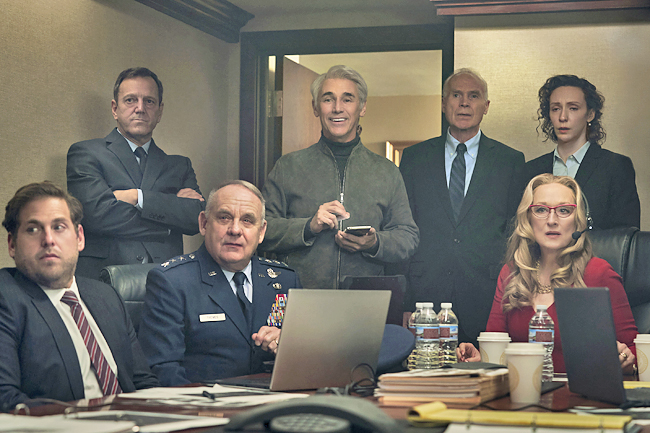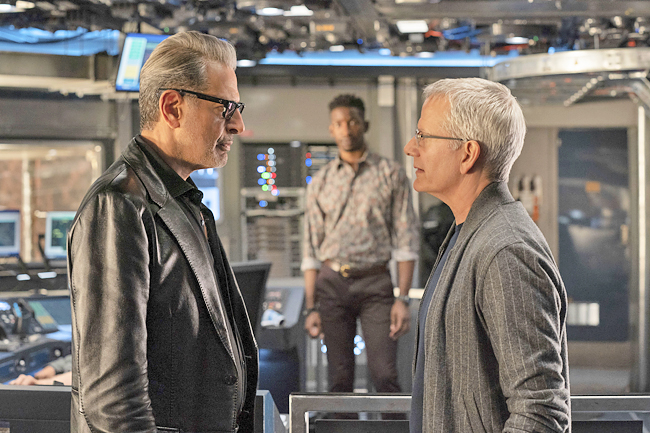Jake Coyle
NEW YORK (AP) – “A toast to the disruptors,” Edward Norton’s tech billionaire says in Rian Johnson’s Oscar-nominated Glass Onion: A Knives Out Mystery.
And why not a toast? Sunday’s Academy Awards won’t give a prize for Best Villain, but if they did, Miles Bron would win it in a walk. (With apologies to the cloud of Nope). He is an immediately recognisable type we’ve grown well acquainted with: a visionary (or so everyone says), a social media narcissist, a self-styled disrupter who talks a lot about “breaking stuff”.
Miles Bron is just the latest in a long line of Hollywood’s favourite villain: the tech bro. Looking north to Silicon Valley, the movie industry has found perhaps its richest resource of big-screen antagonists since Soviet-era Russia.
Great movie villains don’t come along often. The Best-Picture nominated Top Gun: Maverick, like its predecessor, was content to battle with a faceless enemy of unspecified nationality.
Why antagonise international ticket buyers when Tom Cruise vs Whomever works just fine?
But in recent years, the tech bro has proliferated on movie screens as Hollywood’s go-to bad guy. It’s a rise that has mirrored mounting fears over technology’s expanding reach into our lives and increasing skepticism for the not always altruistic motives of the men – and it is mostly men – who control today’s digital empires.
We’ve had the devious Biosyn Genetics CEO (Campbell Scott) in Jurassic World: Dominion, a franchise dedicated to the peril of tech overreach; Chris Hemsworth’s biotech overlord in Spiderhead; and Mark Rylance’s maybe-Earth-destroying tech guru in 2021’s Don’t Look Up.



We’ve had Eisenberg, again, as a tech bro-styled Lex Luthor in 2016’s Batman v Superman; Harry Melling’s pharmaceutical entrepreneur in 2020’s The Old Guard; Taika Waititi’s rule-breaking videogame mogul in 2021’s Free Guy; Oscar Isaac’s search engine CEO in 2014’s Ex Machina; and the critical portrait of the Apple co-founder in 2015’s Steve Jobs.
Kids movies, too, regularly channel parental anxieties about technology’s impact on children. In 2021’s The Mitchells vs the Machines, a newly launched artifical intelligence (AI) brings about a robot apocalypse. Ron’s Gone Wrong (2021) also used a robot metaphor for smartphone addiction. And TV series have just as aggressively rushed to dramatise Big Tech blunders. Recent entries include: Uber’s Travis Kalanick in Showtime’s Super Pumped; Theranos’ Elizabeth Holmes in Hulu’s The Dropout; and WeWork’s Adam and Rebekah Neumann in Apple TV’s We Crashed.
Some of these portrayals you could chalk up to Hollywood jealousy over the emergence of another California epicenter of innovation. But those worlds merged long ago. Many of the companies that released these movies are disrupters, themselves – none more than Netflix, distributor of Glass Onion. The streamer was cajoled into releasing Johnson’s sequel more widely in theatres than any previous Netflix release. Estimates suggested the film collected some USD15 million over opening weekend, the old fashioned way, but Netflix executives have said they don’t plan to make a habit of such theatrical rollouts.
And the distrust goes deeper than any Hollywood-Silicon Valley rivalry. A recent Quinnipiac poll found that 70 per cent of Americans think social media companies do more harm than good. Tech leaders like Meta Chief Mark Zuckerberg have at times been seen favourably by only one in five Americans.
As characters, tech bros – hoodie-wearing descendants of the mad scientist – have formed an archetype: Masters of the universe whose hubris leads to catastrophe, social media savants who can’t manage their personal relationships. Whether their visions of the future pan out or not, we end up living in their world, either way. They’re villains who see themselves as heroes.
“In my mind, he’s really the most dangerous human being around,” Rylance said of his Peter Isherwell. “He believes that we can dominate our way out of any problem that nature hands us. I think that’s the same kind of thinking that’s got us into the problem we’re in now, trying to dominate each other and dominate all the life we’re intimately connected to and dependent on.”
Glass Onion, nominated for Best Adapted Screenplay, presents a new escalation in tech mogul mockery. Norton’s eminently punchable CEO, with a name so nearly “Bro”, is enormously rich, powerful and, considering that he’s working on a volatile new energy source, dangerous. But Bron is also, as Daniel Craig’s Benoit Blanc eventually deduces, an idiot. “A vainglorious buffoon,” Blanc said.
In Johnson’s film, the tech bro/emperor bro truly has no clothes. He’s just skating by with lies, deceit and a bunch of not-real words like “predefinite” and “inbreathiate”.
Even though Johnson wrote Glass Onion well before Elon Musk’s shambolic Twitter takeover, the movie’s release seemed almost preternaturally timed to coincide with it. The Tesla and SpaceX chief executive was only one of Johnson’s real-world inspirations, some took Bron as a direct Musk parody. In a widely read Twitter thread, conservative commentator Ben Shapiro said Johnson was dramatising Musk as “a bad and stupid man”, which he called “an incredibly stupid theory, since Musk is one of the most successful entrepreneurs in human history”. He added, “How many rockets has Johnson launched lately?”
Musk, himself, hasn’t publicly commented on Glass Onion, but he has previously had numerous gripes with Hollywood, including its depictions of guys like him. “Hollywood refuses to write even one story about an actual company start-up where the CEO isn’t a dweeb and/or evil,” Musk tweeted last year.
Musk will soon enough get his own movie. The Oscar-winning documentarian Alex Gibney on Monday announced his several months into work on Musk, which producers promise will offer a “definitive and unvarnished examination” of the tech entrepreneur.
At the same time as the tech bro’s supervillainy supremacy has emerged, some movies have sought not to lampoon Big Tech but to imbibe some of the digital world’s infinite expanse. Phil Lord, who with Christopher Miller has produced The Mitchells vs the Machines and the multiverse-splitting Spider-Man: Into the Spider-Verse, said the Internet has profoundly influenced their approach to film.
“We, legacy media, are responding in maybe subconscious ways to new media,” said Lord.
“We’re all just trying to figure out how to live in the new world. It’s changing people’s behaviour. It changes the way we find and experience love. It changes the way we live. Of course, the stories we tell and how we tell them are going to change as well and reflect that.
Into the Spider-Verse certainly reflects having a lot of content from every era in your brain all at the same time.”
The Best-Picture favourite Everything Everywhere All at Once, too, is reflective of our multi-screen, media-bombarded lives. Writer-directors Daniel Kwan and Daniel Scheinert, whose film is up for a leading 11 Oscars, said they wanted to channel the confusion and heartache of living in the everything-everywhere existence that tech moguls like Miles Bron helped create.
“The reason why we made the movie is because that’s what modern life feels like,” said Kwan.
So even though Miles Bron won’t go home with an Academy Award on Sunday, he still wins, in a way. It’s his world. We’re all just living in it.




